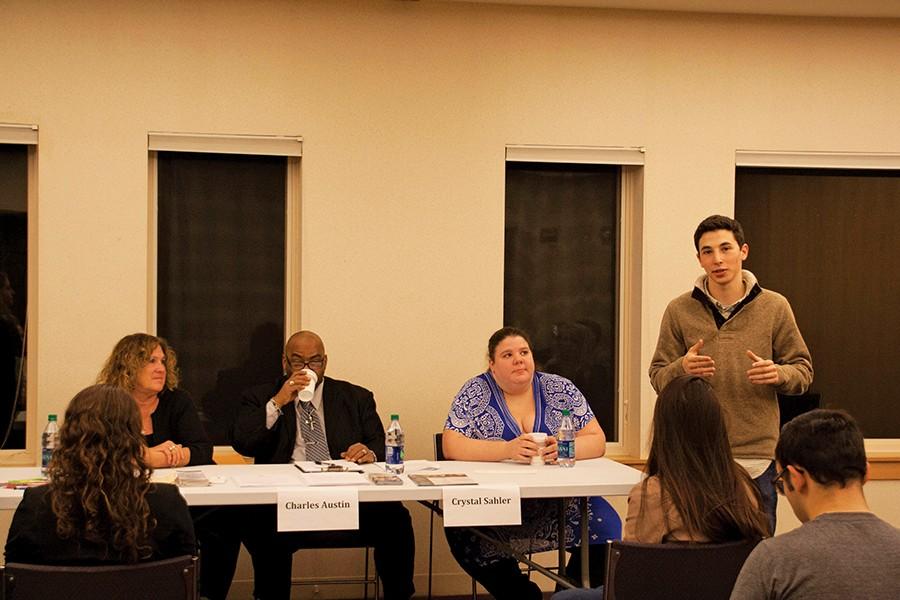Panelists discuss stigmas about homelessness
Katie Pach/The Daily Northwestern
Speakers from the Chicago Coalition for the Homeless and Interfaith Action of Evanston discuss misconceptions about homelessness at an event hosted by Northwestern Hillel. All of the speakers had either experienced homelessness or worked with the homeless.
January 20, 2016
Three speakers emphasized the need for systemic change in the way governments and individuals address homelessness at a panel Tuesday night.
Around 30 people gathered at Fiedler Hillel to hear two panelists from the Chicago Coalition for the Homeless and one from Interfaith Action of Evanston discuss their experiences with homelessness at the event, co-hosted by ZOOZ, Points for a Purpose and the Global Engagement Summit.
The speakers, who had either worked closely with the homeless or who had been homeless themselves, started the event by recounting their personal experiences with the issue.
Charles Austin, special projects coordinator at the Chicago Coalition for the Homeless, said he has been homeless at six different points of his life.
“For me, this is my therapy,” Austin said.
The panelists focused on the reasons people become homeless and the failures of public assistance systems. A major topic of discussion was how to talk about homelessness without dehumanizing those who are homeless, with the speakers emphasizing kindness and respect.
Susan Murphy, the administrative director at Interfaith Action of Evanston, said she first came into contact with homelessness when she left her longtime role as a stay-at-home mom to become a job counselor at the organization she now leads.
“If I was walking down the street and I saw any of you guys and we made eye contact, we’d probably smile and keep walking,” Murphy said. “We’d never see each other again, but there would’ve been contact. But we don’t make eye contact with someone who’s homeless.”
The panelists also talked about problems that homeless people can face in trying to obtain state identification to apply for jobs, which often requires a piece of mail requiring a permanent address or a birth certificate, which not all homeless people have.
In addition to talking about the need for systemic change, the speakers also emphasized the small things people can do to help those who live on the streets. They all recommended against handing out cash or change, and instead promoted offering meals, donating hygiene products and listening to stories.
“When politicians look at the budget and are making these decisions, they see a bunch of numbers and stats,” Austin said. “They don’t get to see the faces or hear the voices. That’s why our work is so important.”
Weinberg senior Paige Ottmar said she was most struck by learning about how broken the system is.
“People are trying to get into transitional housing, trying to get on with their lives, and the system seems to fight against that,” Ottmar said.
ZOOZ president Natalie Stern said the group became interested in hosting a panel on homelessness after learning about the nonprofit Knock Knock Give a Sock, a group that works to provide people on the street with socks.
The Weinberg senior said the group reached out to Points for a Purpose and GES in order to reach the largest audience possible.
The panel was originally the culminating event of the three groups’ weeklong sock drive collaboration, but the campaign was extended through the end of this week because of the holiday weekend, Stern said.
Email: darbyhopper@u.northwestern.edu
Twitter: @darby_hopper


